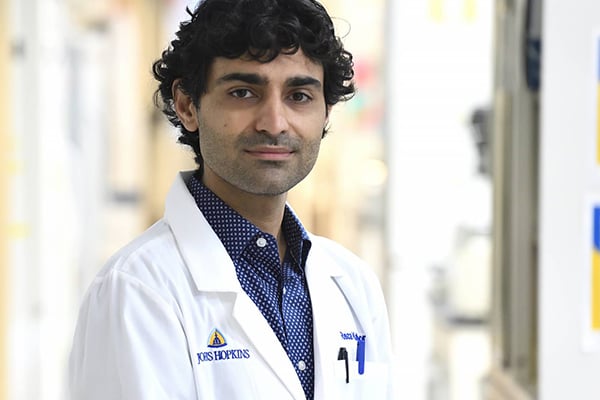All mammalian life originates from the zygote. From that single fertilized cell eventually grow billions of others, dividing and differentiating to form tissues, organs, bones, and muscles. For synthetic biologist Reza Kalhor, who studies the origins of developmental abnormalities in the brain, the zygote is both the source and the mechanism for his research.
Kalhor, who joined the faculty of the Johns Hopkins Department of Biomedical Engineering and the Center for Epigenetics in 2019, uses gene editing technology to insert tiny snippets into the genetic code of zygotes that make it possible to identify the origins of abnormalities as they appear in later stages of embryo growth. The snippet enables cells to record what happens at each stage of their development—sort of like turning on the “track changes” function of their DNA. Studies of neural disorders such as autism and schizophrenia and diseases such as Alzheimer’s and Parkinson’s could all benefit from the ability to trace genetic abnormalities to the source.
“Organisms are like a tree that branches out almost infinitely but starts with one root,” Kalhor says. “We hope that our strategy helps detect even the subtle changes that can alter the trajectory of development.”
His approach is uncommon for the field. Typically, synthetic biologists engineer changes in the functional genetic code and observe how organisms grow and develop as a result. It is difficult to pinpoint the origins of disorders using that approach, however, especially if scientists don’t know what alterations they’re looking for in the first place. The other alternative—recording the status of every cell at every stage of development—is unsustainable using current technology.
Kalhor’s DNA snippet insertion technique makes it possible to work backward in time, instead reading a genetic record of each cell’s particular developmental history to understand how and when things went wrong.
“We want to be able to map development retrospectively because instead of doing exhaustive exploration, we can reconstruct a cell’s history and arrive at the same conclusion,” Kalhor says.
For his trailblazing research, Kalhor has been named one of 20 Packard Fellows for Science and Engineering by the David and Lucile Packard Foundation. As the nation’s largest nongovernmental research fellowship, the Packard Fellowship is designed to support unconventional and innovative lines of research by early career scientists like Kalhor. The prestigious award is accompanied by a grant of $875,000 over five years.
“We’re immensely proud of Reza and his contributions to the field of synthetic biology,” says Ed Schlesinger, dean of the Whiting School of Engineering, which, along with the School of Medicine, houses the Department of Biomedical Engineering. “The spirit of this fellowship celebrates not only individual achievement but also the collective impact that early career engineers and scientists make, and Reza is an outstanding example of both.”
Since its founding, the David and Lucile Packard Foundation has awarded fellowships to 14 scientists and engineers affiliated with Johns Hopkins. Kalhor credits his win to the generous support of his colleagues at Johns Hopkins as well as the mentorship he received as a PhD student at the University of Southern California and as a postdoctoral fellow at Harvard University. He also shares credit with the members of his laboratory at Johns Hopkins, which consists of six permanent and four rotating members.
“In some ways this award is less about me and the funding as it is about the institution and the support that I’ve gotten,” Kalhor says. “My name may be formally on the award, but there are many people who made it possible. I’ve had the great fortune of being supported by incredible scientists—it’s really a team effort.”
– Saralyn Cruickshank

